

Paul Tough on how children succeed. How Children Succeed: Grit, Curiosity, and the Hidden Power of Character. When we started ASCEND, the K-8 school in Oakland, CA., that I've written about here at Edutopia, we asked our students to practice six habits.
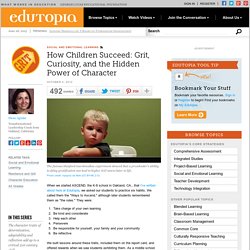
We called them the "Ways to Ascend," although later students remembered them as "the rules. " They were: Take charge of your own learning Be kind and considerate Help each otherPersevere Be responsible for yourself, your family and your community Be reflective We built lessons around these traits, included them on the report card, and offered rewards when we saw students exhibiting them. As a middle school teacher, I knew that it was critical that our students internalize these habits; sometimes I even wondered if they were more important than mastering a grade level standard. Our first class of 48 students graduated from ASCEND in 2004. "What really stuck with me is the ASCEND RULES.
A Long-Awaited Validation I also felt very hopeful reading this book. Perhaps the most powerful, and indisputable, argument in Tough's book is that poverty matters. Education Video: How Children Succeed. Paul ToughIn How Children Succeed: Grit, Curiosity, and the Hidden Power of Character, author Paul Tough presents compelling new (and some old) research indicating that character is an accurate — or even better — predictor of a child’s success than his or her array of cognitive skills.

That — as the subtitle suggests — character strengths like grit, curiosity, self-regulation, conscientiousness, and optimism are the essential factors to achievement in life. Tough sat down with ParentMap to talk about his book and examine this central question: Why do some children succeed while others fail? More about the videoThe story we usually tell about childhood and success is the one about intelligence: success comes to those who score highest on tests, from preschool admissions to SATs.
7 traits kids need to succeed. What if a child's success in school were measured not in IQ but in strength of character?
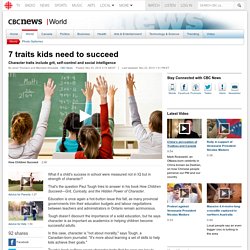
That's the question Paul Tough tries to answer in his book How Children Succeed—Grit, Curiosity, and the Hidden Power of Character. Education is once again a hot-button issue this fall, as many provincial governments trim their education budgets and labour negotiations between teachers and administrators in Ontario remain acrimonious. Tough doesn’t discount the importance of a solid education, but he says character is as important as academics in helping children become successful adults. Lavin Agency Speakers Bureau. #20. A Summary of ‘How Children Succeed: Grit, Curiosity, and the Hidden Power of Character’ by Paul Tough. ‘How Children Succeed: Grit, Curiosity and the Hidden Power of Character’ by Paul Tough (Houghton Mifflin Harcourt; September 4, 2012) Table of Contents: i.

Introduction/Synopsis Section 1: The Cognitive Hypothesis and the Holes Therein 1. 2. A. Paul Tough: "How Children Succeed - The Hidden Power of Character" [Special Address] Required Reading 101 - School of Smock. Why Kids Must Fail — And How They Can Succeed Resilience is a “hot” topic (see above, for one recent book).
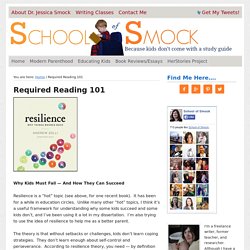
It has been for a while in education circles. Unlike many other “hot” topics, I think it’s a useful framework for understanding why some kids succeed and some kids don’t, and I’ve been using it a lot in my dissertation. I’m also trying to use the idea of resilience to help me as a better parent. The theory is that without setbacks or challenges, kids don’t learn coping strategies. Kids need four basic things (The Four As, if you will) to be able to cope with life’s challenges and to succeed in an increasingly complex world. 1. 2. 3. 4. On this blog, I will be examining research using this framework, with the understanding that families, schools, and communities all have an important role to play in raising resilient kids who can thrive in the face of many challenges.
Paul Tough - How Children Succeed. Paul Tough: How Children Succeed: Grit, Curiosity, and the Hidden Power of Character on Vimeo. How Children Succeed by Paul Tough – review. Anxious parents drawn to this US bestseller by the title will find themselves taking a back-row seat in classrooms full of children far more disadvantaged than their own and learning something useful in the process.
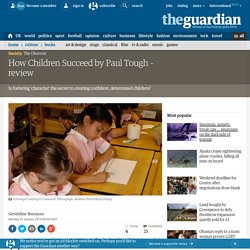
Paul Tough's book is not the straightforward "grow clever children" manual it appears to be. The author has followed some of urban America's poorest young people through their secondary school careers over some years, tracking their rocky road towards higher education and revealing how their teachers are compensating for the missing investment in their early years by fostering what Tough sums up as "character". ‘How Children Succeed’ — Q&A with Paul Tough. Here is a conversation I had by email with Paul Tough about his new book, “How Children Succeed: Grit, Curiosity, and the Hidden Power of Character.”
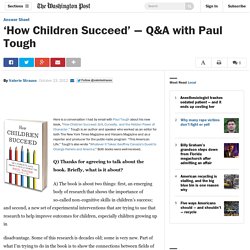
Tough is an author and speaker who worked as an editor for both The New York Times Magazine and Harpers Magazine and as a reporter and producer for the public-radio program “This American Life.” Tough’s also wrote “Whatever It Takes: Geoffrey Canada’s Quest to Change Harlem and America.” Both books were well-received. Q) Thanks for agreeing to talk about the book. Briefly, what is it about? A) The book is about two things: first, an emerging body of research that shows the importance of so-called non-cognitive skills in children’s success; and second, a new set of experimental interventions that are trying to use that research to help improve outcomes for children, especially children growing up in disadvantage. Q) What kind of non-cognitive skills are you talking about and are these things that can really be taught in a classroom?
How Children Succeed by Paul Tough: review. How Children Succeed Quotes by Paul Tough. ‘How Children Succeed,’ by Paul Tough. “Psychologists and neuroscientists have learned a lot in the past few decades about where these skills come from and how they are developed,” Tough writes, and what they’ve discovered can be summed up in a sentence: Character is created by encountering and overcoming failure.
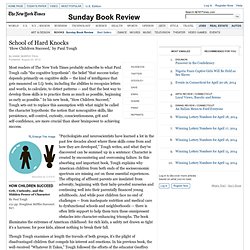
In this absorbing and important book, Tough explains why American children from both ends of the socioeconomic spectrum are missing out on these essential experiences. The offspring of affluent parents are insulated from adversity, beginning with their baby-proofed nurseries and continuing well into their parentally financed young adulthoods. And while poor children face no end of challenges — from inadequate nutrition and medical care to dysfunctional schools and neighborhoods — there is often little support to help them turn these omnipresent obstacles into character-enhancing triumphs. How Children Succeed. Grit, Curiosity, and the Hidden Power of Character Why do some children succeed while others fail?
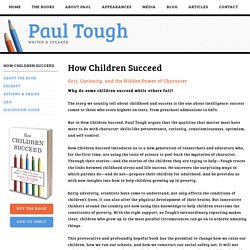
The story we usually tell about childhood and success is the one about intelligence: success comes to those who score highest on tests, from preschool admissions to SATs. But in How Children Succeed, Paul Tough argues that the qualities that matter most have more to do with character: skills like perseverance, curiosity, conscientiousness, optimism, and self-control.
How Children Succeed introduces us to a new generation of researchers and educators who, for the first time, are using the tools of science to peel back the mysteries of character. Through their stories—and the stories of the children they are trying to help—Tough traces the links between childhood stress and life success. Early adversity, scientists have come to understand, not only affects the conditions of children’s lives, it can also alter the physical development of their brains.